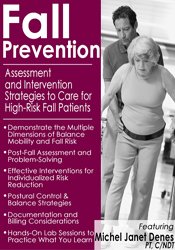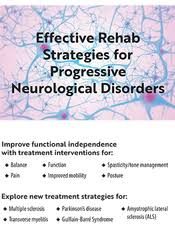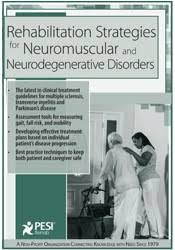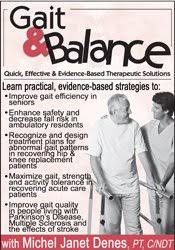🌟 New Year Offer 🌟
Celebrate 2026 with 30% OFF on all products! Use code: NEWYEAR2026. Hurry, offer ends soon!
Available for Pre-Order. This product will be available within a few days.
Michel Janet (Shelly) Denes – Fall Prevention

Description:
Falls and subsequent injuries are an ongoing issue in healthcare and we as clinicians need to know how to intervene to not only treat falls, but also to prevent them before they happen.
During this course you will get the most up-to-date, clinically-relevant evaluation and treatment techniques for improving balance in geriatric and neurologically impaired individuals. A key focus is on learning to select and use the most appropriate tools for assessing balance/risk of falls and evaluating function. You will examine the relationship between cognition, the sensory system and all the musculo-skeletal aspects that impact on balance and fall risk. This will improve your clinical skills in assessment of high-risk fall patients. Providing appropriate pre-(minimizing the risks) and post-fall interventions is very critical to FALL PREVENTION.
OUTLINE
Assessment of Multiple Dimensions of Balance, Mobility and Fall Risk
Three Classifications of Falls
- Accidental
- Unanticipated physiological falls
- Anticipated physiological falls
Balance Dysfunction and Falls: Contributing Factors
- The vestibular system
- Vision
- Somatosensory system
- Muscular strength and joint flexibility
- Endurance, fatigue and fitness level
- Cognition
- Posture
Risk Factors
- Intrinsic risk factors
- Extrinsic risk factors
- Methods for reducing risk factors
- Practical suggestions
- Home safety checklist
- Health and safety checklist
- Fall predictors
Balance, Mobility and Fall Risk Assessment Tools: Individualized Options
- Functional Reach Test
- Tinetti Balance Assessment Tool
- Berg Balance Scale
- Functional Gait Assessment
- The Timed Up and Go Test
- Three and Six Minute Walk Tests
- Full Evaluation of ROM, Flexibility, Muscle Strength and Tone
Effective Interventions to Improve Balance & Mobility and Reduce Fall Risk
Consequences of a Fall
- Physical consequences
- Social consequences
- Psychological consequences
Nutrition
- Strategies to Maintain and Restore Balance
- Stability
- Mobility
The Normal Gait Cycle
Gait Training When it Has Gone Awry
- Considerations for assistive devices and orthotics
Therapeutic Exercise
- Benefits & specifics for balance, ROM, strength and gait
- Equipment for clinics and home use
- Program design
- Safety reminders
- Home exercise program
- Environmental Modification/Home Evaluation
Post-Fall Assessment and Problem Solving Prevention
- Fall risk identification
Problem Solving After a Fall Occurs
- Investigation process
- Plan of action
- Corrective and preventative measures
Community-Based Care
- Develop community-based fall prevention programs for older adults
Overcoming Barriers to Effective Strategy Implementation
- Cognitive barriers
- Family barriers
- Facility staff/Caregiver barriers
Medicare and Documentation Considerations
Interactive Lab Time: Assessment Tools and Intervention Strategies in Practice
Would you like to receive Michel Janet (Shelly) Denes – Fall Prevention ?
OBJECTIVES
- Identify the most challenging fall predictors to be able to put in place a fall prevention plan.
- Explore current evidence-based therapeutics and research in movement strategies for geriatric and neurologically impaired individuals.
- Determine the most effective evaluation techniques for the highest risk populations you see in practice.
- Choose the best strategies for fall prevention based on individualized assessment.
- Incorporate the most appropriate functional balance testing tools for specific settings.
- Differentiate between various types of therapeutic interventions, including: gait training, exercise, assistive devices and orthotics as appropriate.
- Develop a comprehensive balance training and fall risk reduction program for individuals with balance dysfunction.
Course Features
- Lecture 0
- Quiz 0
- Duration Lifetime access
- Skill level All levels
- Students 0
- Assessments Yes



